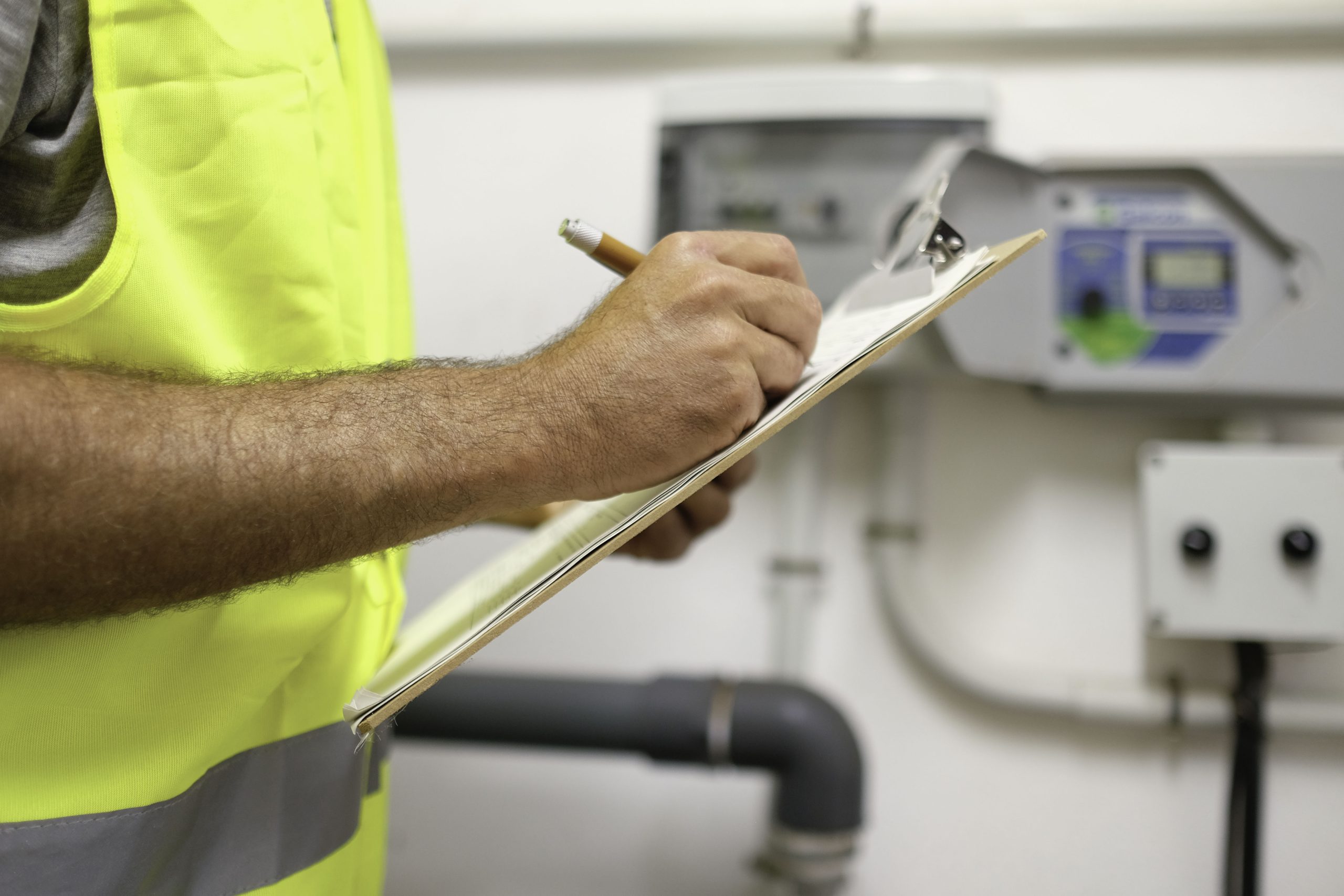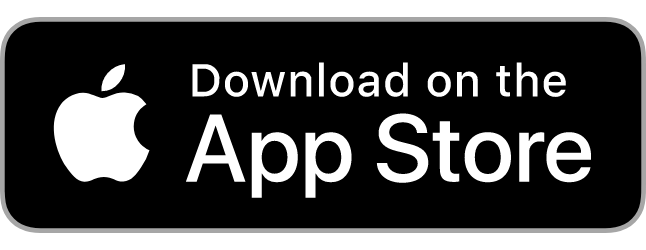Did you know that 73% of plumbing companies have adopted digital tools to improve customer service?
For facility managers, plumbing issues can disrupt operations and lead to unexpected costs. Implementing effective plumbing management software can streamline service requests, enhance communication, and reduce downtime.
Use this guide to find out which tools work for your facility and which ones are better suited for small plumbing teams.
What Is Plumbing Management Software?
Plumbing management software helps your plumbing team stay on the same page, even when they’re working across locations or shifts. It gives you one place to track jobs, manage vendors, and communicate with your team.
You can log service calls, assign tasks, and monitor job progress in real time. The best tools let you upload photos, set priorities, and get updates without chasing anyone down.
Everything is saved, including the customer’s complete service history. Your techs can pull up notes, past issues, and the phone number on the customer’s profile to keep every conversation clear and informed.
Plumbing management software also improves how you handle customer interactions. Faster response times, clearer communication, and fewer errors mean higher customer satisfaction. It’s a major asset for delivering personalized customer service that helps build long-term trust.
What Should You Look for in Plumbing Management Software?
If you’re running a plumbing business or handling service requests across multiple sites, you need software that gives you:
- Easy work order submission with photo uploads
- Real-time updates on job progress
- Scheduling and dispatching tools
- Access for both office and field teams
- Built-in customer management
If you’re dealing with service delays or scattered information, these features help centralize everything so tasks move forward without confusion.
Some platforms include tools that make coordination easier, like:
- Billing and invoicing through accounting software
- Inventory management for parts and supplies
- Scheduling for recurring maintenance
- GPS tracking for plumbing technicians
- Custom job forms and checklists
These features help when your plumbing team handles multiple jobs daily, works across locations, or services more complex plumbing systems.
Beyond features, make sure the software supports your team’s long-term success. Platforms that offer performance insights, learning resources, or checklists can also serve as valuable management tips to guide daily decisions and avoid repetitive mistakes.
Best Facilities Plumbing Management Platforms
If you’re a facility manager, retail operator, or someone responsible for maintaining commercial properties, plumbing problems can’t be ignored. These platforms help you submit service requests, track vendor work, and stay updated on plumbing jobs.
1. Trillium
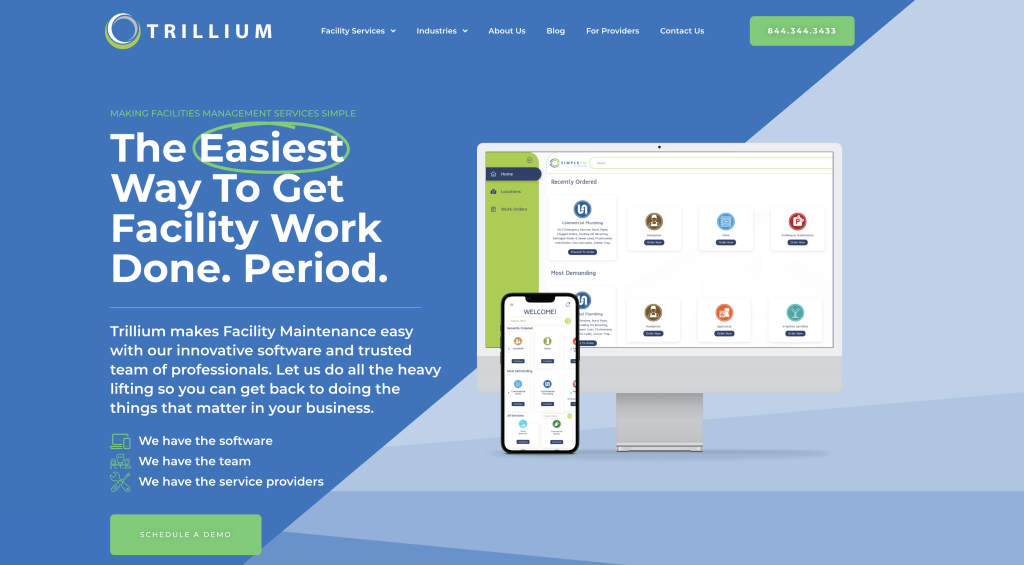
Trillium can help you manage plumbing issues without the delays, markup games, or paperwork piles. It’s a facility maintenance software platform that lets you submit plumbing work orders, upload photos, set job priorities, and get real support from anywhere.
Top Features
- Submit plumbing service requests through a clean, intuitive dashboard
- Upload job site photos and flag urgent repairs
- Track work order status with real-time updates
- Connect with 6,000+ pre-vetted, licensed plumbing contractors across 47 states
- Get 24/7 support from trained service experts
- Skip the admin hassle with automatic paperwork (COIs, W9s, invoices, closeouts)
Whether you’re managing one building or hundreds, Trillium brings order to plumbing jobs that would normally drain your time and patience.
Traditional plumbing service software often comes with long-term commitments and unnecessary overhead. Trillium flips the model. It gives you a free, flexible way to handle plumbing problems without wasting hours chasing updates or trying to find someone qualified by the phone number on the customer’s profile.
Looking for a plumbing software solution that respects your time and budget? Trillium is the only one on this list that doesn’t charge a cent to use.
2. Worksmith

Source: Worksmith.com
Worksmith helps businesses manage facilities and operations across multiple locations through a single, easy-to-use platform. It’s built for brands with retail stores, restaurants, or commercial properties that need consistent service without chasing vendors.
Top Features
- Track repairs and maintenance in real time
- Schedule janitorial and deep cleaning services
- Coordinate store openings and closures
- Manage laundry and garment care
- View service history and customer information in one portal
Pros
Worksmith saves time by centralizing operations, reducing manual follow-ups, and simplifying vendor communication. Its clean interface makes it easy to view job status, manage multiple locations, and access important service details.
Cons
Businesses in smaller markets may have fewer vendor options. Some users also find customization and third-party integrations limited compared to niche facility tools.
Best Tools for Large-Scale Plumbing Operations
If you’ve ever had to dig through email threads to find out whether a repair got done, you already know why better plumbing management matters. These platforms help you resolve service issues, respond more quickly, and keep your team and vendors aligned.
3. BuildOps
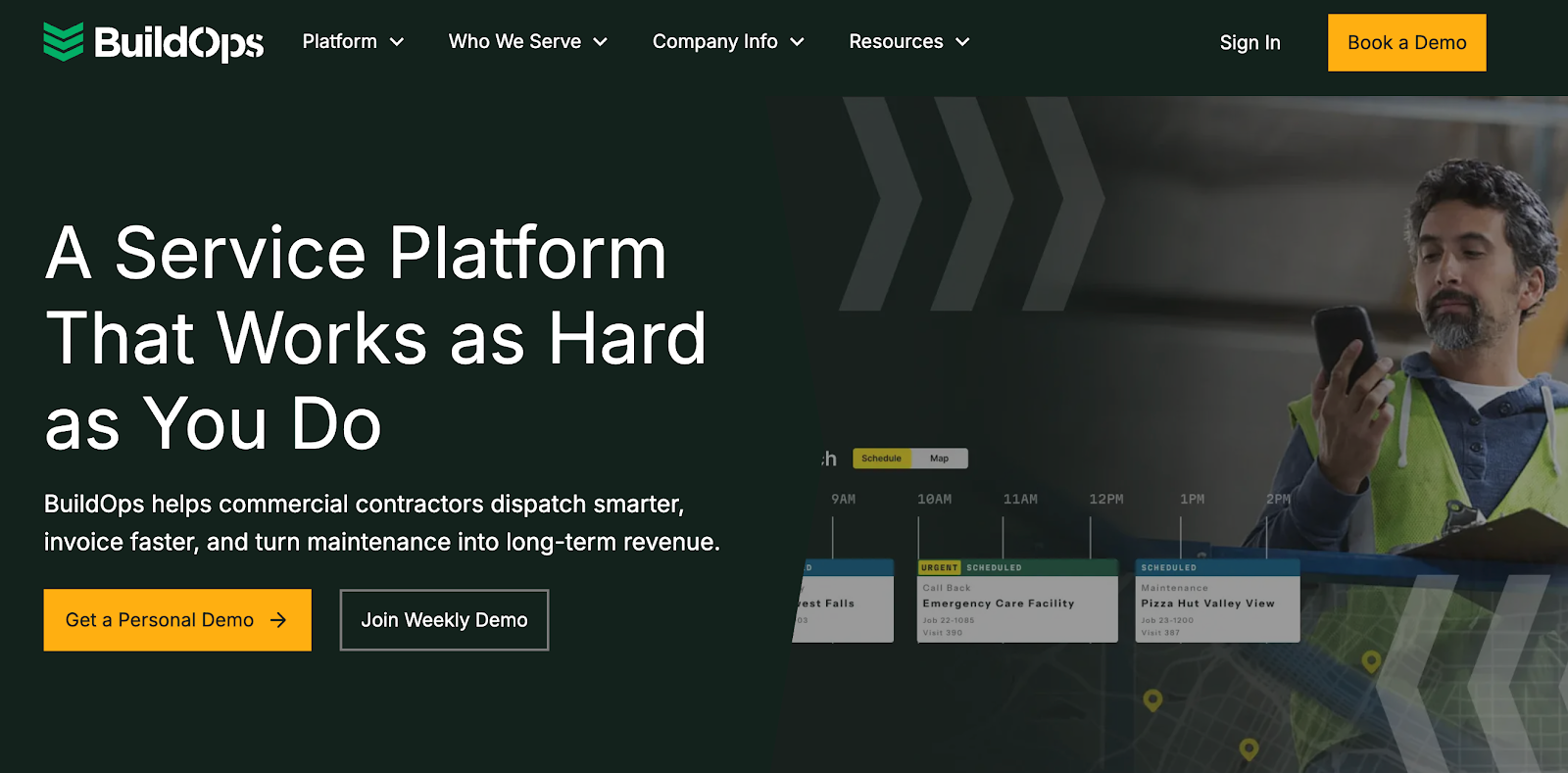
Source: Buildops.com
BuildOps is a field service platform built for commercial contractors who need better visibility across teams and jobs. It supports plumbing business management by centralizing quotes, schedules, job updates, and technician locations in one place.
Top Features
- Drag-and-drop dispatch board
- Quote builder with photo and video support
- Live dashboards for tracking job performance
- Job history with customer communication logs
- Integrates with popular accounting software
Pros
BuildOps makes it easy to send professional quotes and follow up without jumping between tools. It’s helpful for teams that want to track key performance indicators across multiple job site locations and reduce delays in the service process.
Cons
Pricing isn’t listed on the site, so budgeting takes extra effort. Integration options are limited, and businesses that don’t need performance dashboards may find the tool more comprehensive than they need.
4. FieldEdge
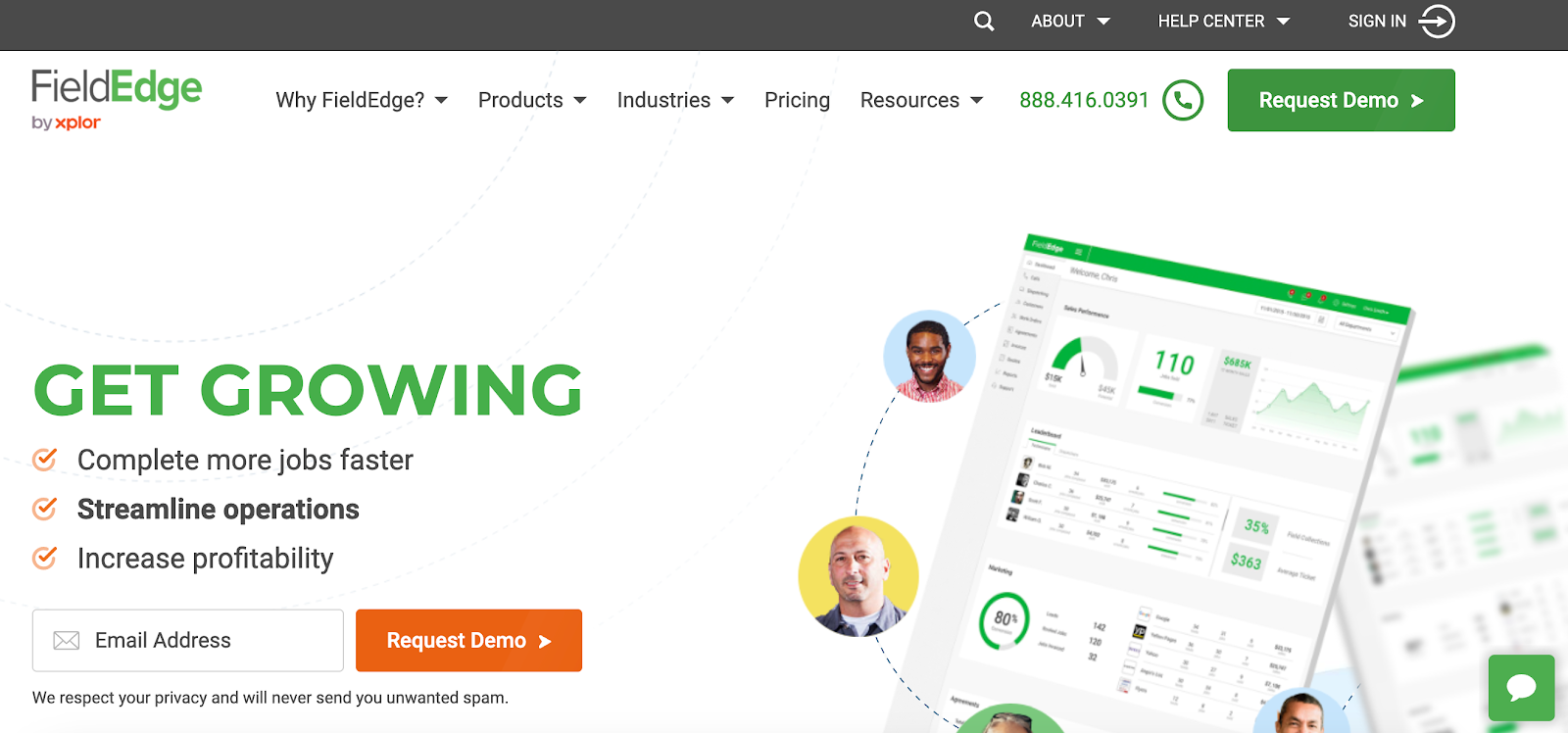
Source: Fieldedge.com
FieldEdge is plumbing service software made for small plumbing businesses that want to connect office teams and field techs in real time. It helps manage job scheduling, quoting, and invoicing while technicians are on site.
Top Features
- Smart dispatch board for job scheduling
- Mobile app for customer notes, pricing, and invoices
- Visual pricing tools with recommended add-ons
- Service agreement tracking and automation
- Live QuickBooks integration
Pros
FieldEdge is useful for plumbers who want to send quotes and invoices while still on the job site. The app keeps everyone on the same page, whether they’re in the office or in the field.
Cons
Users often report bugs that cause the app to crash, especially during quote creation. Losing progress mid-job or during customer interactions is a recurring complaint, and it creates extra work during already packed schedules.
Best Tools Made for Independent Plumbing Companies
If you’re running a small plumbing business or handling residential and light commercial jobs, you need software that keeps your schedule tight and your clients happy. These platforms are built for independent plumbers who want to manage jobs, track payments, and stay organized.
5. Jobber
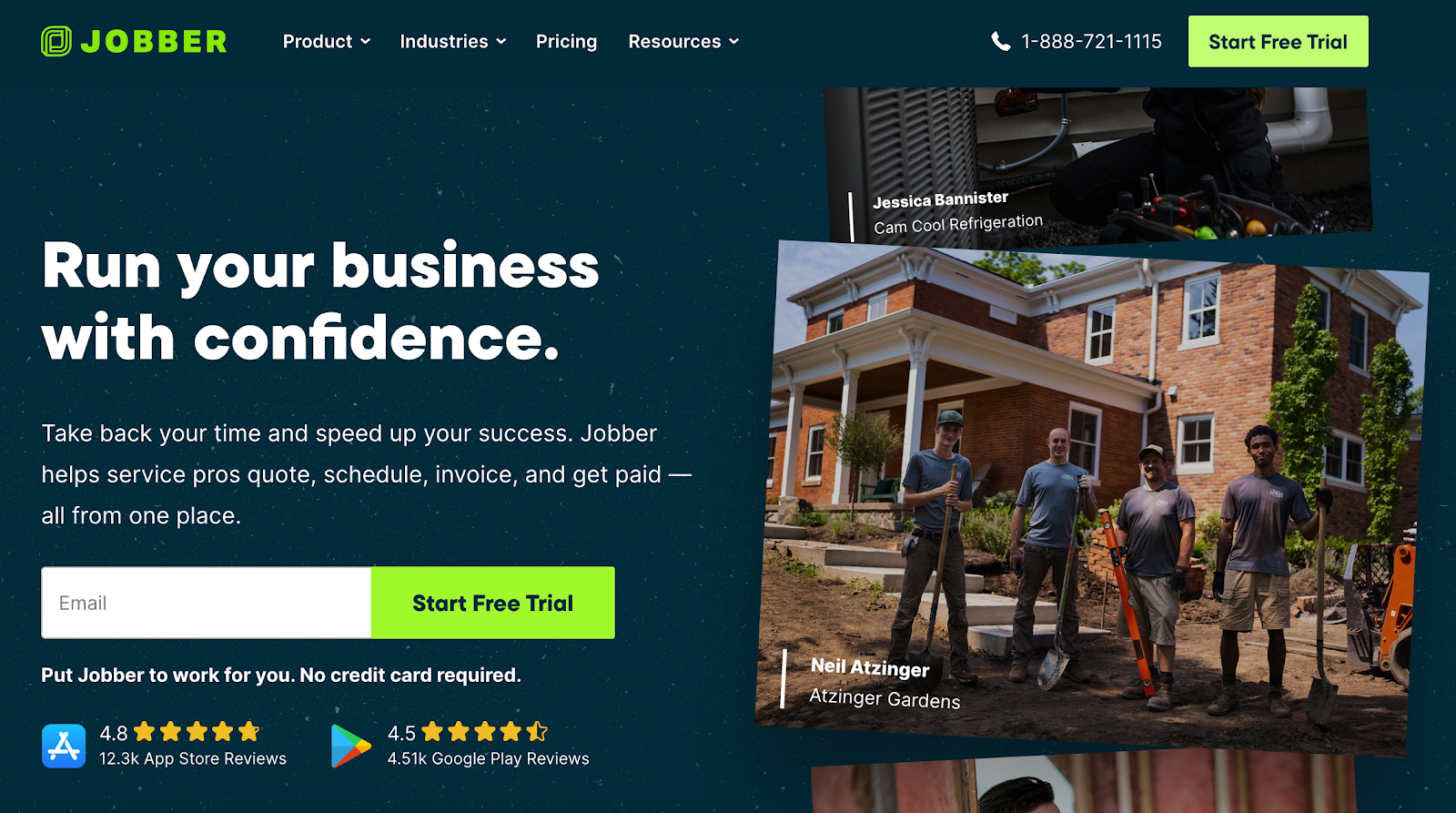
Source: Getjobber.com
Jobber gives small plumbing businesses a simple way to manage clients, schedule jobs, and collect payments. It centralizes your customer details, job notes, and payment history in one place.
Top Features
- CRM with job history, notes, and messages
- Drag-and-drop calendar for scheduling
- Mobile app with GPS tracking and time clock
- Invoicing, quotes, and on-site payment collection
- “On my way” alerts and appointment reminders
Pros
Jobber helps independent plumbers stay organized without adding stress. You can pull up the phone number on the customer’s profile, job notes, and visit history while on-site.
Cons
Users often mention that reports are too basic and lack the detail needed to evaluate business performance. Others note that calendar features on the mobile app can be clunky, which leads to missed updates or scheduling confusion.
6. mHelpDesk
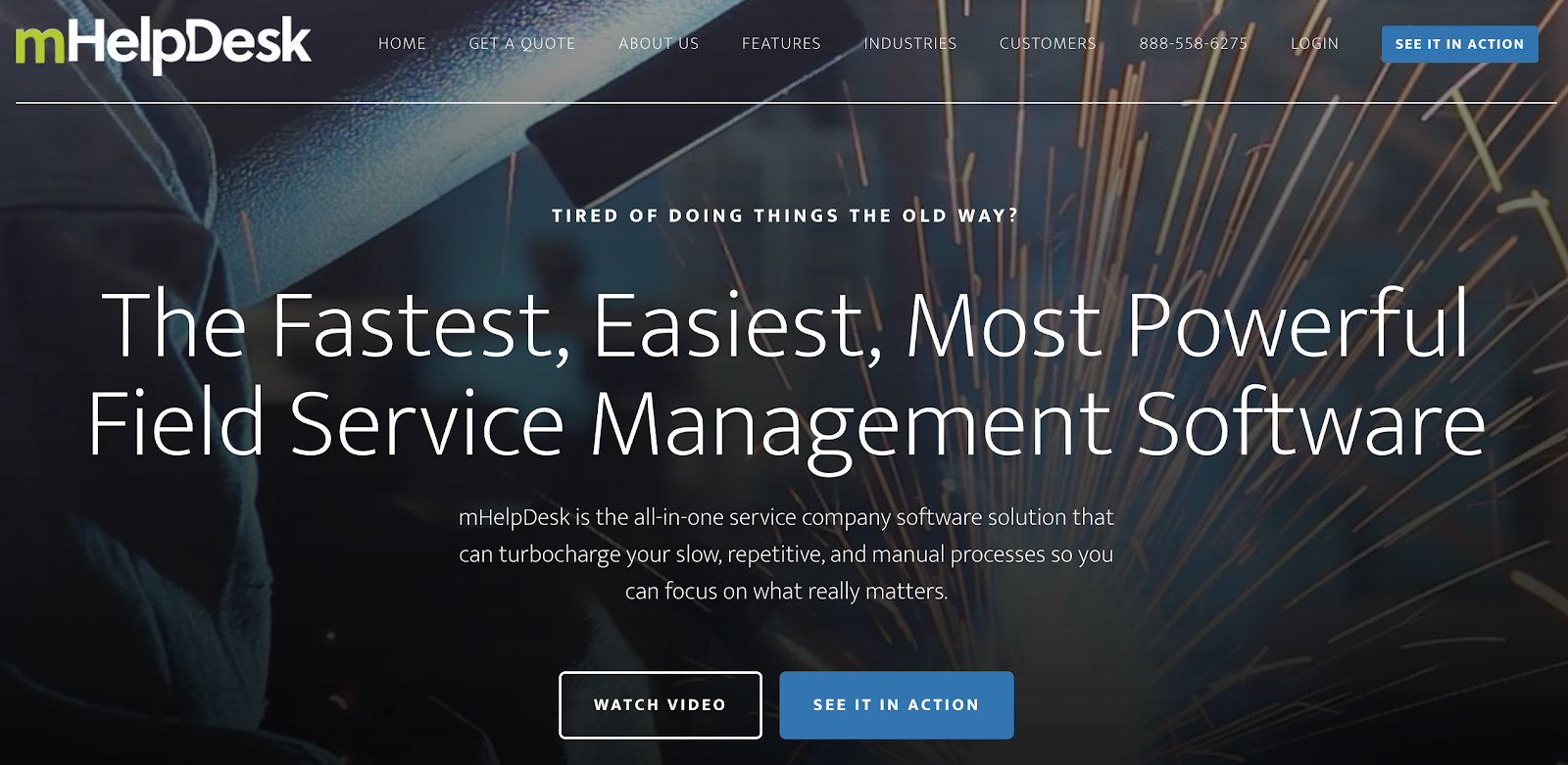
Source: Mhelpdesk.com
mHelpDesk is field service management software that helps plumbing teams manage everything from job intake to final payment. It brings your field and office staff into the same workflow, so nothing gets lost in translation.
Top Features
- Drag-and-drop job scheduling with real-time updates
- Offline mobile app for field access
- Customizable job forms and checklists
- Integrated calendar with Google Calendar sync
- Invoicing and on-site payment options
Pros
mHelpDesk is helpful for plumbing companies that want a single hub to track job progress, manage scheduling, and keep office and field staff aligned. The mobile app is a solid tool for handling service calls and collecting payments out in the field.
Cons
Users report slowdowns when working with large data sets, especially on mobile. Reporting tools are basic and can feel limiting if you need more detailed views of business operations.
7. RazorSync
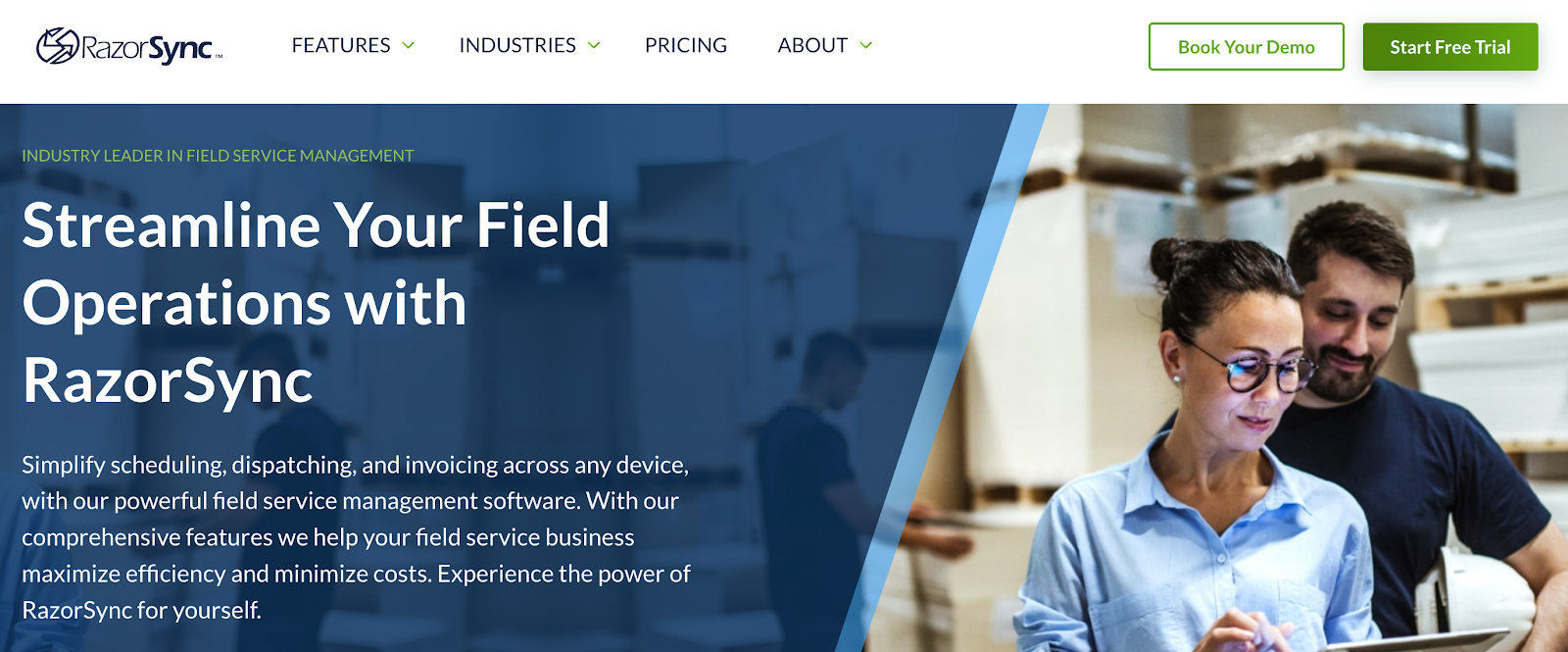
Source: Razorsync.com
RazorSync is field service management software for small plumbing crews who work on the go. It helps manage schedules, technician locations, and customer payments with a mobile-first setup.
Top Features
- Map-based technician tracking
- Drag-and-drop scheduling with route optimization
- On-site invoicing and payment processing
- QuickBooks sync for billing
- Custom tagging and job alerts
Pros
RazorSync is useful for small teams that want to reduce fuel costs and keep tabs on where techs are during the day. It’s designed for plumbers who need a lightweight tool that helps with dispatching and customer communication.
Cons
Users mention frequent app glitches and slow sync times between mobile and desktop. Some users also report delays in updates, which can affect job coordination during busy periods.
8. Field Complete
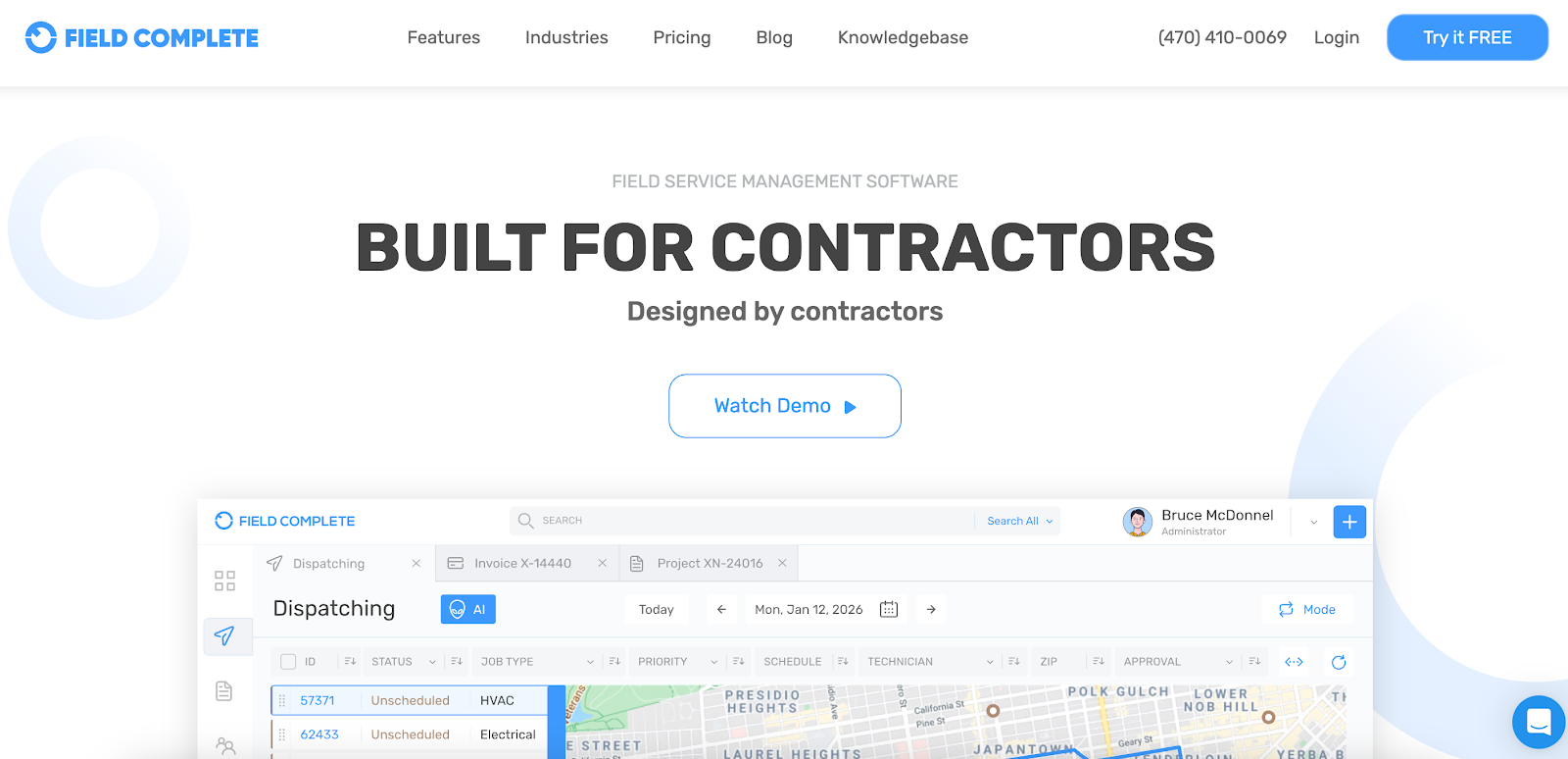
Source: Fieldcomplete.com
Field Complete is a flexible job tracking software tool for individual plumbers or small teams who work with subcontractors. It helps separate internal tasks from outside work while offering simple tools for dispatching and job status updates.
Top Features
- Drag-and-drop dispatching board
- Separate dashboards for internal teams and contractors
- Built-in route planning with collapsible job map
- On-site estimates and invoicing
- Real-time location tracking for plumbing technicians
Pros
Field Complete is suitable for small plumbing businesses that manage both in-house jobs and outside contractors. It gives a quick view of job progress and supports productivity even without a mobile signal.
Cons
There’s no built-in time tracking, which makes it harder to monitor labor. Some features don’t always function as expected, and QuickBooks is the only available integration.
Tips for Choosing a Dependable Plumbing Software Solution
Choosing software for your plumbing operation isn’t just about ticking feature boxes. Below are tips that help you pick a platform that supports real service outcomes.
Match the Software to Your Plumbing Tasks
Your platform should support the work your team does every day, from emergency leaks to scheduled inspections. A system that’s too general or overly complex won’t support fast-moving plumbing tasks or urgent repairs.
Support for Real-Time Coordination
Look for a solution that promotes clear and timely communication between office and field teams. Real-time updates, job notes, and quick access to scheduling prevent delays and keep service calls moving without backtracking.
Enable Better Customer Management
Choose software that offers centralized access to contact details, job notes, and the phone number on the customer’s profile. This allows your team to respond confidently, without searching for missing information or repeating questions.
Designed for the Field Service Industry
Unlike generic ticketing systems, plumbing business software should be built with the field service industry in mind. It needs to support dispatching, job tracking, invoicing, and technician mobility.
Prioritize Operational Efficiency
The right platform should reduce steps, not add them. Features like smart job scheduling, route planning, and plumbing inventory tracking all work together to improve operational efficiency and reduce waste.
Base Your Choice on Real Use
Don’t just go with what looks good on paper. Look at online reviews, run a trial with your team, and see how the software performs in real scenarios. If it helps your crew in the field and improves coordination, that’s a strong sign it’s a good fit.
Focus on Customer Loyalty
Software that helps you deliver the best customer service, on-time arrivals, personalized notes, and fast responses leads to stronger customer loyalty. When people know they can count on your team, they’re more likely to come back and refer others.
Align With Business Growth
Whether your focus is better margins, stronger retention, or easier scaling, your software should support your long-term direction. A successful plumbing business depends on tools that keep up with you, not slow you down.
Look for Features That Reduce Admin Load
Modern tools should simplify more than just scheduling. Look for features like maintenance agreements, flexible billing, and automated job follow-ups that lighten the back-office workload without losing visibility.
Support Your Marketing and Outreach
Software that connects to review tools, social media platforms, or email campaigns helps you reach potential customers more easily. Great service speaks for itself, but your marketing strategies should work alongside it, not against it.
Even if you still rely on traditional marketing channels, the right tool brings your marketing efforts into one manageable system.
By focusing on tools that support communication, cut out waste, and improve service quality, you’re building a more agile and resilient service company.
Handle Repairs Without Disrupting Plumbing Business Operations
Plumbing issues shouldn’t derail your day or your business operations. Trillium gives you a faster way to handle plumbing work without the typical vendor delays, inflated invoices, or paperwork piles.
This facility maintenance software lets you submit plumbing work orders in seconds. Snap a photo, set a priority, and get matched with a qualified vendor from Trillium’s nationwide network.
You can track progress in real time and leave the paperwork to Trillium, without wasting hours on manual data entry.
There are no software fees, no contracts, and no minimums. Just one clear platform built to keep plumbing work moving and help you save money on overhead, downtime, and vendor friction.
Get started with Trillium today!
FAQs About Plumbing Management
What is the highest-paid plumbing job?
Some of the highest-paying roles in the plumbing industry include union foremen, master plumbers in large commercial projects, and plumbing inspectors working in government or high-compliance sectors. These roles can offer six-figure salaries, especially in urban areas with high demand and complex infrastructure.
How do I become a plumbing manager?
Most plumbing managers start as licensed plumbers and build experience in the field. Over time, they take on leadership roles, manage teams, oversee scheduling, and handle job estimates.
Some move into this role from a project supervisor or senior technician position after showing they can lead jobs effectively and communicate with clients.
What does a plumbing operations manager do?
A plumbing operations manager oversees daily plumbing business operations, including scheduling and dispatching, inventory, budgeting, customer communication, and ongoing training for staff.
They make sure plumbing technicians are on track, materials are available, and service calls stay on schedule. This role often involves both field knowledge and office coordination.






